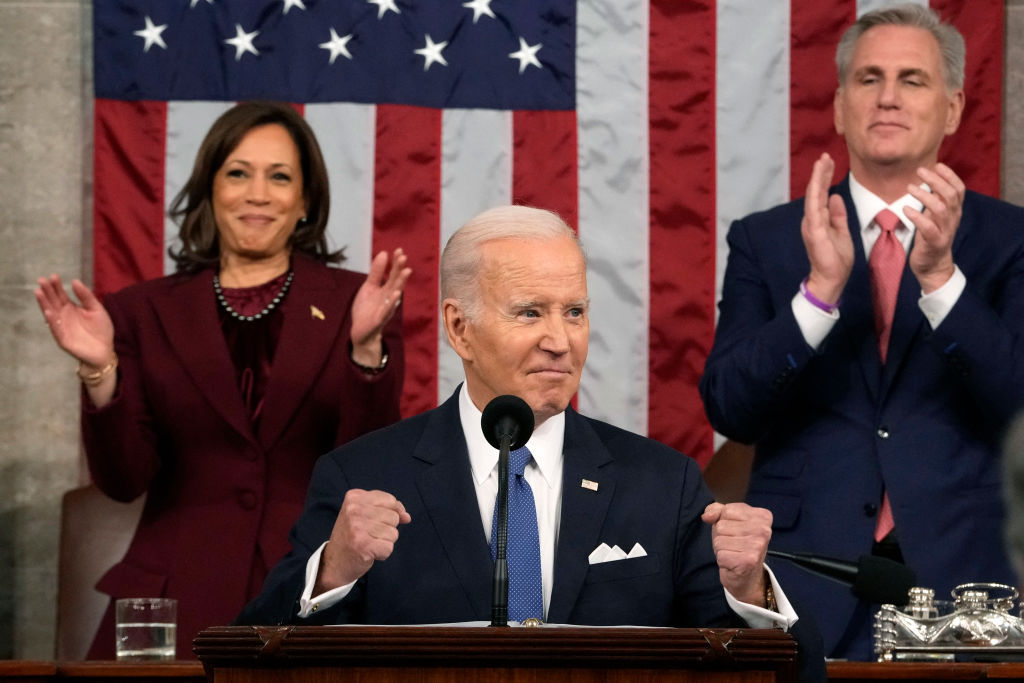Biden Hammers Big Tech, Tweaks Cable in State of the Union
President plugs bills that would target early termination fees

The smarter way to stay on top of the multichannel video marketplace. Sign up below.
You are now subscribed
Your newsletter sign-up was successful
President Joe Biden took Big Tech to task, and got in a shot at cable fees, in his State of the Union speech Tuesday night (February 7), with Big Tech getting the brunt of the criticism.
“The idea that cable, internet and cellphone companies can charge you $200 or more if you decide to switch to another provider — give me a break,” he said during the part of his speech when he hammered various industries — “big pharma,” airlines — over what he called “junk fees.”
He said those “hidden surcharges” add up to hundreds of dollars a month. The Biden administration has proposed the Junk Fee Prevention Act, which would include those cable early-termination fees.
Biden also called for Congress to pass legislation banning noncompete agreements and strengthening antitrust enforcement to prevent “big online platforms” from advantaging their own products.
Toward the end of the speech, Biden said social media had to be held accountable for “experimenting with children for profit” and called for legislation to stop Big Tech from collecting personal information about children and teenagers, impose stricter limits on data collected on adults and ban targeted advertising to children.
The Computer & Communications Industry Association pointed out that while Biden’s speech cited economic progress, the president then essentially bit the hand that fed that economic engine. “Digital services in the connected economy help combat inflation with lower prices, and U.S. tech leadership produced $684 billion in digitally-enabled exports in 2021 alone,” CCIA said.
The Connected Commerce Council, which emphasizes the impact of legislation and regulation on small business but whose name “partners” prominently include Google and Amazon, was not pleased.
“President Biden's call to rein in America's leading technology companies is the latest misguided attack against America’s digitally empowered small businesses,” said council executive director Rob Retzlaff. "Forcibly changing how the digital economy works would cost small businesses $500 billion over five years, an absurd price for American small businesses to pay.”
The Interactive Advertising Bureau stood up for the targeted advertising the president was targeting in his speech. “Punishing bad actors is a must, and IAB supports stronger laws to protect kids, but blaming data and technology for complex problems, and restricting or eliminating digital advertising, could severely diminish the benefits of the internet for everyone,“ IAB said.
The argument goes that it is the targeted nature of online advertising that supports the free content model.
House Energy & Commerce Committee chair Cathy McMorris Rodgers (R-Wash.) said the president had left out that his administration had “colluded with Big Tech companies to censor Americans” and was now intimidating Big Tech into policing content online.
Republicans argue that efforts by Democrats to weed out disinformation or hate speech are instead efforts to pressure edge providers into censoring conservative voices, actions they call an attack on the First Amendment.
Sen. Ed Markey (D-Mass.), for one, signaled he was ready to follow his leader into the Big Tech regulatory fray.
“Our agenda must prioritize holding big corporations accountable,” he said following the speech, including by “reining in Big Tech companies that track our children’s data and target them with manipulative ads.”
Markey has made children's exposure to media a signature issue since his days as a House leader on communications oversight, including the Children's Online Privacy Protection Act and the Children's Television Act of 1990. ▪️
The smarter way to stay on top of the multichannel video marketplace. Sign up below.
Contributing editor John Eggerton has been an editor and/or writer on media regulation, legislation and policy for over four decades, including covering the FCC, FTC, Congress, the major media trade associations, and the federal courts. In addition to Multichannel News and Broadcasting + Cable, his work has appeared in Radio World, TV Technology, TV Fax, This Week in Consumer Electronics, Variety and the Encyclopedia Britannica.

